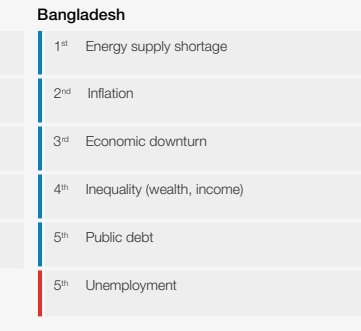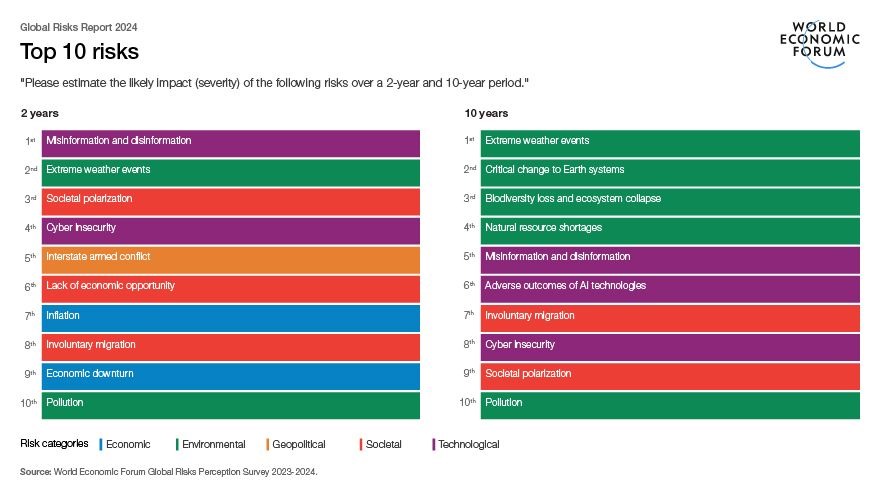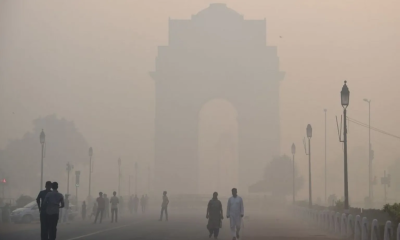Already reeling from the forex reserve debacle with more economic challenges feared by the new government, Bangladesh now faces a set of challenges as warned by the World Economic Forum (WEF).
In its latest report titled the Global Risks Report published on January 10, the Geneva-based organization said energy supply shortage will be the top threat for the country in the next two years.
The second and third risks will be inflation and economic downturn.
Inequality in wealth and income comes fourth on the list, followed by public debt and unemployment.
The list of risks was assessed by surveying 71 companies.

The WEF`s report, produced in partnership with Zurich Insurance Group and Marsh McLennan, draws on the views of over 1,400 global risks experts, policymakers and industry leaders surveyed in September 2023.
"The majority of respondents (54%) anticipate some instability and a moderate risk of global catastrophes, while another 30% expect even more turbulent conditions. The outlook is markedly more gloomy over the 10-year time horizon, with nearly two-thirds of respondents expecting a stormy or turbulent outlook," it says.
It comes as the government started functioning with a brand-new cabinet on Sunday, with both the prime minister and finance minister separately vowing to face economic challenges.
Meanwhile, the five-day 54th annual meeting of the WEF starts today in Davos-Klosters, Switzerland.
Experts worried
Reacting to the report, experts say that the findings were revealed at a time when the entire world, which is still bearing the brunt of the COVID-19 pandemic, is witnessing some crucial wars including the Israel-Palestine and Ukraine-Russia ones.
Added to the woes are environmental and climatic issues, they add.
M Zakir Hossain Khan, chief executive of the non-profit organization Change Initiative, said that specifically for Bangladesh, the energy supply shortage risk deepened on the back of the ongoing Middle East conflicts.
“Both global and national risk profiles have emphasized that environmental and climate disasters may jeopardize the supply chain of natural resources, badly hampering food security,” he said.
Consequently, it will be challenging to attain the targets of sustainable development including environmental sustainability and poverty reduction, he feared.
Dhaka-based think tank Centre for Policy Dialogue’s Khandaker Golam Moazzem told a Bangla daily that the survey conducted on businesses found fuel shortage is one of the major risks now, citing the ongoing energy crisis in the country.
Half of 10 risks in next decade environmental
Five out of 10 threats to the global economy in the next decade are directly linked to the environment, according to the study.
And more two risks are also related to environmental issues.
The top risk on this list is extreme weather events such as cyclones, floods, droughts and wildfires.
The second threat is a critical change to the Earth`s system, followed jointly by biodiversity loss and ecosystem collapse.
Natural resource shortage is the fourth major threat, with misinformation and discrimination being the fifth and adverse outcomes of AI technologies the sixth.
Involuntary migration, cyber insecurity and societal polarization ranked the seventh, eighth and ninth consecutively.
Pollution is at the bottom of the list, picking the 10th position.
Involuntary migration and societal polarization are very much linked with climate change and extreme weather events while societal polarization is interlinked with misinformation.

Five threats directly come from the environment and two from climate change and extreme events.
It means 70 percent of the global risks in the next 10 years will be generated from environmental loss and rapid climate change.
Zakir said, “Intensely connected the planet in terms of both natural resources as well as supply chains the Global Risks Report 2024 have rightly identified that environmental risks could hit the point of no return in the next decade; among the top 10 over the longer term with the warming phase of the El Niño-Southern Oscillation (ENSO) cycle projected to intensify and persist until May."
Bangladesh at war against misinformation
Misinformation and disinformation are the leading risks for the next two years in the global economy.
Extreme weather events, societal polarization, cybersecurity, and interstate armed conflict are the following four risks, the report said.
The issue is misinformation is already in the news as an estimated 4 billion people in more than 50 nations — almost half the world’s population — are set to vote in national elections, with the outcomes likely to shape global politics for years or decades to come.
Bangladesh has long been fighting misinformation.
Talking on this issue on Sunday, newly-appointed State Minister for Information and Broadcasting Mohammad Ali Arafat said the government plans to establish a framework to ensure accountability for spreading disinformation and rumours.
" Misinformation and disinformation spread through social media very fast. For this reason, we need a new strategy, he said.
Threatening scenario
Bangladesh failed to meet the International Monetary Fund`s target on keeping $17.78 billion as the minimum net international reserve as of December 31.
The inflation in December eased further, but the average inflation in 2023 remained elevated.
Bangladesh Bureau of Statistics on Sunday said that the monthly inflation in December was recorded at 9.41 percent.
The year 2023 was the most challenging year for the energy and power sector as the government was thrown into a deep and intensive challenge of the volatility created in the global fuel market due to the adverse impacts of the Russia-Ukraine war and the consequent devaluation of local currency amid the dollar crisis.
Compared to 2019, the reliance on imported fuel and electricity in 2023 grew to almost 50%. The contribution of own primary fuel depleted to the lowest in the past eight years. Severe stress has been created for about $5.0 billion in outstanding payments. The power sector owes $4.0 billion and the energy sector US$1.0 billion. The government will assume office with this outstanding payment burden.
The total number of unemployed people stood at 24.30 lakh in the July-September period of 2023.








-20251226051932.jpeg)
-20251222051606.jpeg)
-20260225072312.webp)











-20260224075258.webp)













-20260219054530.webp)
-20260218060047.jpeg)
